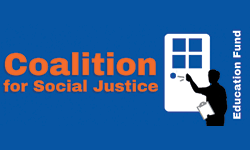KIP Student Feature – Alina Keshodkar
 During the summer of 2024, Alina Keshodkar (CAS’26, Political Science & Economics) completed an Environmental Policy internship with the Coalition of Social Justice, assisting with their campaigning initiatives and conducting research about climate inequity on both a local and national level. Keep reading to learn more about Alina’s summer at CSJ and the important work they are doing to uplift local communities in the Greater Boston Area.
During the summer of 2024, Alina Keshodkar (CAS’26, Political Science & Economics) completed an Environmental Policy internship with the Coalition of Social Justice, assisting with their campaigning initiatives and conducting research about climate inequity on both a local and national level. Keep reading to learn more about Alina’s summer at CSJ and the important work they are doing to uplift local communities in the Greater Boston Area.

Q&A with Alina Keshodkar
Could you give us a brief description of the organization you are interning with and what your primary responsibilities are during this internship?
The Coalition for Social Justice (CSJ) is a non-profit organization in the Greater Boston Area geared towards uplifting local communities through active voter engagement and increasing constituency voices in local legislation. As these areas are also disproportionately made up of impoverished minorities, CSJ prioritizes the intersectionality of different policy issues with social justice to properly serve these different groups of people. The organization works to build powerful, grassroots movements for social change within these policy areas that are driven by the local people and build the capacity of people to impact the social policies that affect the lives of such individuals.
What area(s) of justice does this organization work in and how did your internship help promote/fulfill these justice goals?
My specific internship was as an Environmental Policy Intern, assisting with their campaigning initiatives combatting environmental racism. My primary responsibilities during the summer were to conduct broader research about climate inequity on both a local and national level, attend weekly campaign meetings and shadow initiative organizers, and review affiliated state legislation. I also gained more insight into the immigrant communities in these areas and assisted with creating more accessible information about climate change to promote education around such topics and actions individuals can take to combat the effects of global warming. Many of these communities have power plants or other harmful external entities, further exacerbating their air and water quality, as well as their overall living conditions. CSJ helps support their goals and provides them with the tools to remove societal barriers and regain their right to a clean, healthy, and sustainable environment.
Has your work this summer changed how you think about justice issues?
I definitely have gained a broader understanding of how education can be a more powerful tool within environmental justice, as many individuals who actually experience the impacts of mass industrialization are those in smaller areas who lack the capacity to fight these larger establishments. Such work also gave me insight into how vital self-determination and active participation can be to successfully push forward a movement and demand accountability. Social justice can be seen in many different forms, and everyone should have a personal investment in their community to strive for change, as smaller-scale local policies are often more impactful and important to an area than broader national policies.
Learn more about the Kilachand Internship Program here.